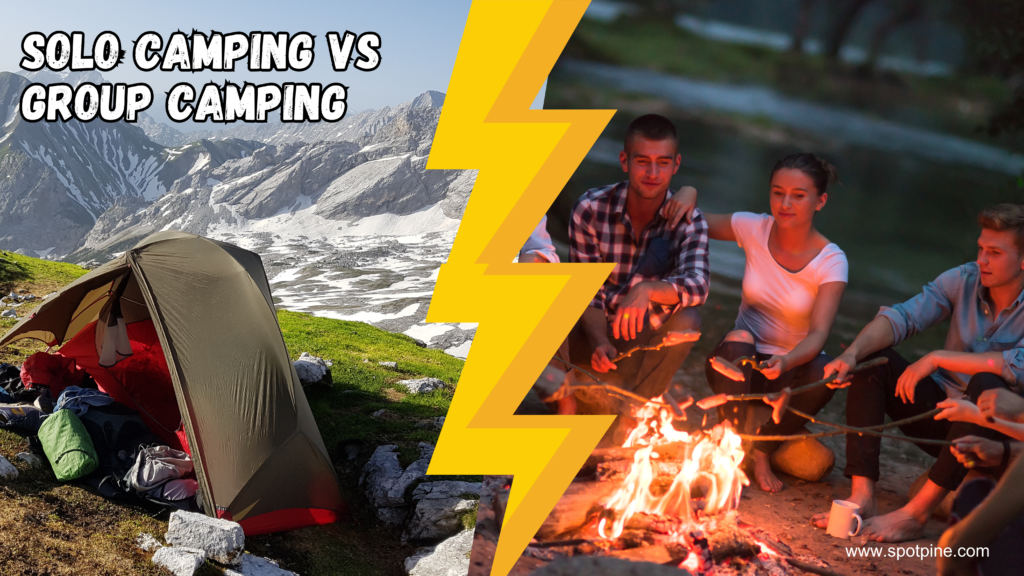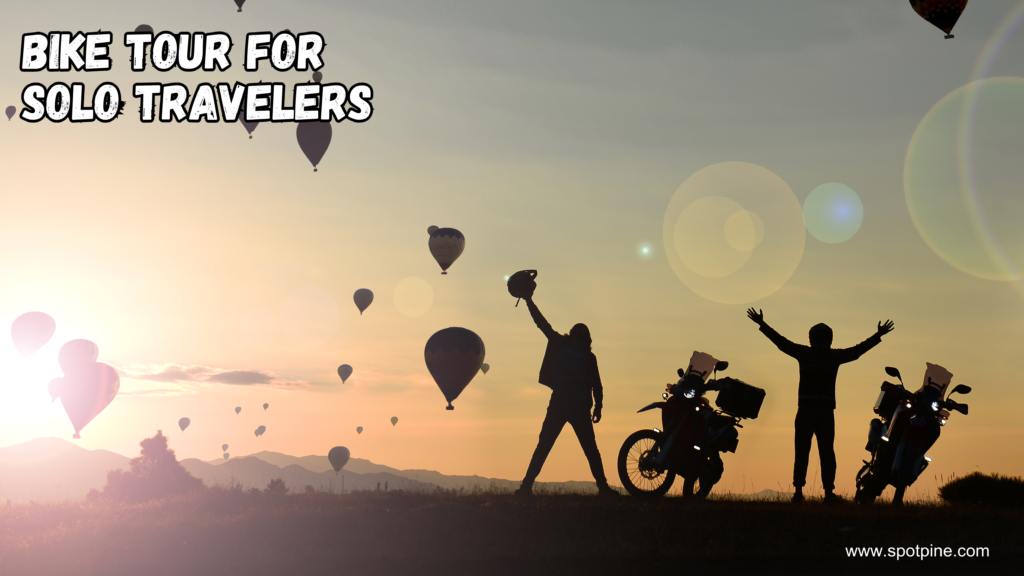Camping is a fantastic way to connect with nature and rejuvenate your mind and body. When deciding between solo camping vs. group camping, it’s important to understand the pros and cons of each to choose the right experience for your adventure
Solo Camping
| Pros | Cons |
| 1. Independence | 1. Safety Concerns |
| 2. Peace and Quiet | 2. Feeling Isolated |
| 3. Personal Growth | 3. Limited Help if Needed |

The solo camping vs. group camping debate often comes down to personal preference, as solo camping offers peace and quiet, but also has challenges.
When you choose to go solo camping, you embrace the freedom and independence of being on your own. It allows you to make decisions based solely on your preferences. Whether it’s choosing the perfect campsite or planning your day’s activities, you have complete control over your camping experience.
The peace and quiet of solo camping can be incredibly rejuvenating. You get to disconnect from the hustle and bustle of daily life and truly unwind in nature. This solitude can be a rare and refreshing break from a fast-paced world, making it ideal for those seeking some time for reflection or relaxation.
Solo camping also offers an opportunity for personal growth. You learn to rely on yourself and become more self-sufficient, boosting your confidence along the way. Tasks such as setting up a tent, cooking, and navigating trails all help you sharpen your outdoor skills.
However, solo camping comes with its own set of challenges. Safety concerns, such as injuries or getting lost, can become more pronounced when you are out in the wilderness alone. Having no one to rely on during an emergency could be stressful.
Feelings of isolation may also creep in, especially during quiet evenings around the campfire when you might wish for companions to share stories with. It’s natural to miss the human connection when you’re camping alone.
In case of emergencies or unexpected situations, having limited help available could make solo camping a risky endeavor. Whether it’s a sudden storm or an injury, dealing with unexpected situations alone is not easy.
Group Camping
| Pros | Cons |
| 1. Shared Experience | 1. Less Privacy |
| 2. Safety in Numbers | 2. Potential Conflict |
| 3. Division of Tasks | 3. Noise and Disturbance |

Group camping offers a bonding experience like no other. Sharing the joys and challenges of camping with friends or family can create lasting memories. From laughing around the campfire to exploring trails together, these shared moments can strengthen relationships and create stories to tell for years to come.
Having others around can enhance safety; in the case of emergencies, having multiple people to rely on can provide peace of mind. Group members can help with navigation, assist in setting up camp, and provide extra support during challenging situations.
Dividing tasks among group members can make camping more efficient and enjoyable. Whether it’s cooking, gathering firewood, or setting up tents, having many hands on deck means the work is shared. This allows everyone to relax and enjoy their time in nature.
On the flip side, group camping may mean sacrificing some privacy. With more people around, finding moments of solitude can be challenging. If you enjoy a quieter experience in nature, group camping may not always provide the serene moments you’re seeking.
Potential conflicts or disagreements within the group can arise, affecting the overall camping experience and creating tension among participants. Different personalities, opinions, or even minor issues like meal choices can lead to friction.
Lastly, noise and disturbance from fellow campers can take away from the tranquillity of nature, especially if some members are not considerate of others. Not everyone has the same idea of a peaceful camping trip, and a noisy group can diminish the serene connection with the wilderness.
Choosing Your Camping Style
The decision between solo camping and group camping boils down to your personal preferences and camping goals. If you crave independence, self-discovery, and tranquillity, solo camping might be the perfect fit for you.
On the other hand, if you value shared experiences, safety in numbers, and the camaraderie of group activities, then group camping could be more your speed.
Whichever you choose, remember that both solo and group camping have their unique advantages and challenges. The key is to pick the option that aligns best with your camping style and desired outcomes.
Whether you embark on a solo adventure or gather your friends for a group camping trip, the most important thing is to enjoy the great outdoors, make memories, and cherish the time spent in nature. Ultimately, whether you choose solo camping or group camping, both options offer unique experiences that depend on what you’re seeking from your trip.
Read How to Deal With Loneliness While Solo Camping?
In conclusion, choosing between solo camping vs. group camping depends on what you want to gain from your experience. Solo camping provides personal freedom, a peaceful atmosphere, and a chance for growth, while group camping emphasizes shared experiences, safety, and the distribution of tasks. No matter your choice, the joy of being surrounded by nature is the ultimate reward. Make sure to prepare adequately, bring the right gear, and most importantly, have fun on your next camping trip!
FAQs :
What Are The Benefits Of Solo Camping?
Solo camping allows for personal growth, self-reflection, and a chance to disconnect from the hustle and bustle of everyday life.
Is Group Camping More Fun Than Solo Camping?
Group camping offers opportunities for socializing, sharing responsibilities, and creating memorable experiences with friends and family.
What Should I Consider When Choosing Between Solo And Group Camping?
Consider your preference for solitude or social interaction, your camping skills, and the activities you want to engage in during the trip.




Pingback: Finding Solo Time On A Group Tour: Expert Tips and Tricks